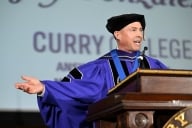You have /5 articles left.
Sign up for a free account or log in.
It began with a simple query from my wife, “What happened to all of your keys?” While she was traveling for work, I had returned the three keys to the university that had filled the real estate of my keychain. I have never been the woman wearing “dungarees, lace-up books, and keys, ring of keys,” but those three keys seemed to add the appropriate heft. I elided the question; my wife knows I am unemployed. There is no need to state the obvious: the keychain is another manifestation of all that has been lost.
Last week, an administrator from my former university asked me if my access to our courseware was shut off. It has not been terminated, yet. While I am not mourning the loss of access to courseware, the question reminded me that at some point in the next few weeks my access to the university library will end. I do not yet have a plan for how I will access current journal articles to stay up to date in the field. I fear that as page proofs come in over the fall and winter for publication, proofing and responding to editorial inquiries will be more time intensive as I find a way to work around my lost library access. I hope that I have good records on my computer to make these tasks easier. I think that I will be able to go (sneak?) onto campus, search and download articles, and consult books in the stacks, but I am not sure. I have to learn how to handle my own research after eight years of online access to databases. I would love suggestions from readers who have found themselves untethered from university resources.
This past weekend, while submitting an article with my co-author, I encountered an online submission system that mandated that I supply an institutional affiliation before I could register and submit the manuscript. I paused for amoment. I confess, it was more than a pause; it was was a moment of panic. What should I type? I have resisted the appellation independent scholar. After three failed years on the job market, that affiliation suggests to me another failure, the failure of having any sort of affiliation as well as any academic position. Yet there is no other term that suffices. I have no academic title. I am productively unemployed. So I typed into the affiliation box: independent. I submitted the article.
I wish I could say, I thought no further about this incident, but I have. As each day of August passes and people march to the beginning of the school year, I am reminded daily of what I am losing in my unaffiliated state: keys, library access, the coveted affiliation, income, an office address for my CV, letterhead. The only thing that mitigates the losses is what I am gaining: time and space to write, which is why I wanted to enter a Ph.D. program lo those many years ago.
Julie R. Enszer, Ph.D., is a scholar and a poet. Her book manuscript, A Fine Bind, is a history of lesbian-feminist presses from 1969 until 2009. Her scholarly work has appeared or is forthcoming in Southern Cultures, Journal of Lesbian Studies, American Periodicals, WSQ, and Frontiers. She is the author of two poetry collections, Sisterhood (Sibling Rivalry Press, 2013) and Handmade Love (A Midsummer Night’s Press, 2010). She is editor of Milk & Honey: A Celebration of Jewish Lesbian Poetry (A Midsummer Night’s Press, 2011). Milk & Honey was a finalist for the Lambda Literary Award in Lesbian Poetry. She has her MFA and Ph.D. from the University of Maryland. She is the editor of Sinister Wisdom, a multicultural lesbian literary and art journal, and a regular book reviewer for the Lambda Book Report and Calyx. You can read more of her work at www.JulieREnszer.com.








